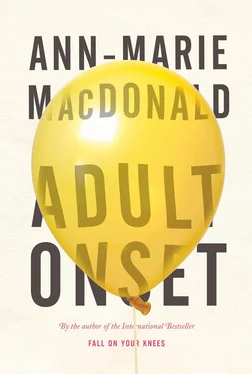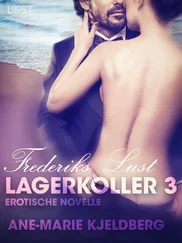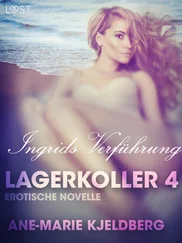She did not question him this time. She was old enough to identify the scent of shame. Andy-Pat retired from the stage and went back to pulling out clumps of her hair and she went back to hating that little brat . The end of their mother’s rope was frayed. “C’mere till I annihilate the both of you!”
No matter how many clumps of hair he pulled from her head, or how often she told their father on him—“Dad is going to kill you!”—she and Andy-Patrick returned to one another, compelled by a folie à deux , or merely their job description that mirrored that of the sheepdog and coyote in the old cartoon, each punching the clock at the dawn of the workday—“Mornin’ Ralph,”
“Mornin’ Fred”—then proceeding to do battle.
She took to terrorizing them both with an entity called Zygote from the Planet Zytox. They’d be in the basement rec room that their father had finished with wood panelling and scalloped plaster on the ceiling — this was the room where the whole family had watched the moon landing. The room with the crawl space. Heralded by an intergalactic beeping that she produced by sucking in air backward through her larynx, the alien who had inhabited Mary Rose’s body would croak in a metallic voice, “I am Zygote from the Planet Zytox. Your sister, Mary Rose, is being held prisoner there.”
She had bangs and a pixie cut. A&P had a brush cut — his eyelashes were extra curly, having been recently singed when he leaned over the manhole where Travis Orr had emptied go-kart fuel and followed it with a lit match.
“If you do not follow my instructions, she will be killed immediately,” rasped Zygote. Andy-Pat’s lip quivered and he swore to do whatever he was told to save his sister — he even attempted to assault Zygote, who nipped it in the bud: “Your feeble attempts to harm me only make it worse for your sister, who at this very instant is being tortured on Zytox.”
Andy-Pat would cease, meek once more, and might be rewarded with a breathless “visit” from the real Mary Rose, who was able to break through intermittently—
“Andy-Pat, you have to do whatever Zygote says, don’t tell him I’ve been here, and remember, even when you think it’s me, it’s really him doing a perfect imitation of me, but I have a plan, I’ve found an ally on Zytox, just pretend—”
A screed of static would intervene and reptilian Zygote would be back:
“Andrew-Patrick, who was here in my absence?”
A&P would tremble. “No one.”
The ante was upped when Zygote’s mother, Zygrette, broke in and, in kinder elderly metallic tones, said, “My son is evil, dear Andy-Patrick, you must be brave, I am trying to save your sister—” But Zygote ousted her and, with larynx-shredding cold-bloodedness, delivered the coup de grâce , “In a moment, the woman who calls herself your mother will call you for supper. Go upstairs and act normal. She is an imposter from the Planet Zytox. So is the man who calls himself your father. Your real parents are both being held prisoner on the Planet Zytox. If you don’t act normal, they will be killed.”
And from upstairs would issue their mother’s summons, “Kids, come for supper!”
She walked her brother to school on the days when he was neither sick nor suspended, and they never knew when, in an eerily neutral voice, she might inquire, “Who do you think that is, putting the sprinkler out on his front lawn?”
“Mr. Chown.”
“No,” she would say serenely, “it looks like Mr. Chown, it sounds like him, but it’s not him. It’s a man called Mr. Mannington. What street are we on?”
“Our street.”
“It looks like our street. The houses look the same and have families that are identical to the families on our street, but this is not our street. It is actually a street called Prince Duke Avenue on the Planet Mearth. You think we are speaking English, but we are not. We are speaking Mearthingian.”
One fall day, Maureen bundled her and Andy-Patrick into the family Buick to get them out of the house because Mum was hurling herself into the walls. Mary Rose had seen Maureen’s room and thought that was why Mum was angry — it was even messier than usual, drawers yanked out and overturned, closet looted of clothes that lay strewn across the floor, some still on hangers, looking like people who’d been mowed down by gunfire. But it turned out Mum had done it.
It was after lunch and Mum was still in her shortie nightgown and nylon slippers that Aunt Sadie had knitted. Her powerful pony legs were bare, her varicose veins, “from carrying you kids,” stood out against the frills of her nightgown. She was staggering and bellowing, but Mary Rose caught only a glimpse because Maureen seized her head, jammed it face-first against her chest and marched her backward out to the front porch where she had already put Andy-Patrick. “Get in the car.” Maureen had turned fifteen. Old enough to flee the advance of the Red Army with a family in tow, older than her grandmother by the time she had had three children. But not old enough to drive. Mary Rose and Andy-Patrick sat at attention in the back seat grinning while Maureen muttered something and lurched into reverse.
She drove out to the locks at Kingston Mills. It rained. They looked at the canal. There were places where you could drive a car right in if you weren’t careful. Andy-Patrick and Mary Rose listened respectfully as Maureen explained the feat of nineteenth-century engineering. “Wow, Mo, that’s really neat.” Their sister was good, and they clung to her and her clean knowledge fiercely like the demons they were, grateful to those who mistook them for human children.
Their father was back in Hamilton, finishing up his MBA, paralyzed with concentration over a stats book. For them.
It was just before or after her first operation, for her arm was in a sling, when Mary Rose succumbed to temptation yet again. Taking the photo album along with a flashlight, she ducked, careful not to bump her arm, through the small door in the rec room wall and into the crawl space. She sat cross-legged, hunched beneath the joists, with the album in her lap and closed her eyes. She felt for the particular series of three notches along the edge of the velvety old page, opened the album, and then her eyes. To see a blank spot. The photo was gone. All that remained was a darker black square where it had been, and the caption, written in white pencil in her mother’s hand, “Cemetery.” The flush of shame was immediate, she felt her face turn red in the dark. Her mother must have seen the way she looked at the picture over and over again … And taken it away.
That winter, Dolly took a ceramics class and fired no fewer than thirty miniature Christmas trees.
•
Mary Rose was standing next to her father before the Hudson’s Bay department store window in downtown Kingston, watching teddy bears skate on a silver pond as a train wove through glittering hills. Santa was in the caboose, drinking a Coke. Her arm was in a sling made from her mother’s scarf. It was dark out. The pit of her stomach felt hot and wet. She was keenly aware of the privilege of being on her own with her father, no Andy-Patrick there to share the limelight, no Mum to hurry them along, and yet something was not right. She was conscious of an unbidden sexual excitement as she watched Santa tipping the bottle to his lips. She knew something the teddy bears did not know. She was not worthy to be watching them along with her father and the other innocent children. She had a secret simmering within her. A bad one. It was connected to the pain in her arm. Pain like extra information she carried around. Pain that was no more than she deserved.
Being with her father sometimes made the pain worse; perhaps because he lived in such a sunny place — a place that was at times too bright, like the glassy pond. When the pain went away, so did the sense of being exiled to a narrow vantage point, a crack in the rocks. It was a pain that dwelt in darkness. The pain that dared not speak its name.
Читать дальше












